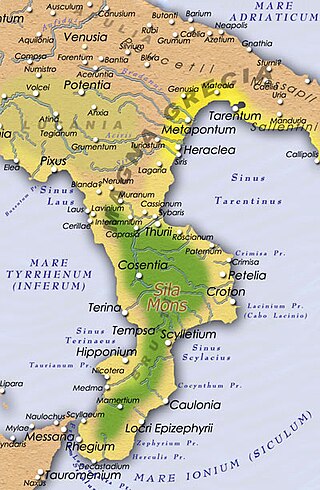Related Research Articles
Decimus Junius Brutus Callaicus was a consul of the Roman Republic for the year 138 BC together with Publius Cornelius Scipio Nasica Serapio. He was an optimate politician and a military commander in Hispania and in Illyria. He was the son of Marcus Junius Brutus and brother of Marcus Junius Brutus. He had a son also named Decimus Junius Brutus and his grandson was Decimus Junius Brutus Albinus.
Titus Manlius Torquatus was a politician of the Roman Republic. He had a long and distinguished career, being consul in 235 BC and 224 BC, censor in 231 BC, and dictator in 208 BC. He was an ally of Fabius Maximus "Cunctator".

The Battles of Kroton in 204 and 203 BC were, as well as the raid in Cisalpine Gaul, the last larger scale engagements between the Romans and the Carthaginians in Italy during the Second Punic War. After Hannibal’s retreat to Bruttium due to the Metaurus debacle, the Romans continuously tried to block his forces from gaining access to the Ionian Sea and cut his eventual escape to Carthage by capturing Kroton, the last port which had remained in his hands after years of fighting.

Marcus Atilius Regulus was a Roman statesman and general who was a consul of the Roman Republic in 267 BC and 256 BC. Much of his career was spent fighting the Carthaginians during the first Punic War. In 256 BC, he and Lucius Manlius Vulso Longus defeated the Carthaginians at the naval battle off Cape Ecnomus; afterwards he led the Roman expedition to Africa but was defeated at the Bagradas River in spring of 255 BC. He was captured and then probably died of natural causes.
Tiberius Sempronius Longus was a Roman consul during the Second Punic War and a contemporary of Publius Cornelius Scipio. In 219 BC, Sempronius and the elder Scipio were elected as consuls for 218 BC. At the outbreak of the war in 218 BC, he was ordered to conduct the war effort in Sicily and Africa, while Scipio was sent to the Iberian Peninsula to attack Hannibal himself. Sempronius was allocated two Roman legions, 16,000 allied infantry, 1,800 allied cavalry, 160 quinqueremes and 20 lighter vessels. As soon as his army was assembled he moved his forces to Sicily. Striking from Lilybaeum Sempronius captured Malta from the Carthaginians.
Marcus Cornelius Cethegus was a Roman Republican consul and censor during the Second Punic War, best known as a political ally of his kinsman Scipio Africanus.

The gens Sempronia was one of the most ancient and noble houses of ancient Rome. Although the oldest branch of this gens was patrician, with Aulus Sempronius Atratinus obtaining the consulship in 497 BC, the thirteenth year of the Republic, but from the time of the Samnite Wars onward, most if not all of the Sempronii appearing in history were plebeians. Although the Sempronii were illustrious under the Republic, few of them attained any importance or notice in imperial times.
Publius Licinius Crassus Dives was consul in 205 BC with Scipio Africanus; he was also Pontifex Maximus since 213 or 212 BC, and held several other important positions. Licinius Crassus is mentioned several times in Livy's Histories. He is first mentioned in connection with his surprising election as Pontifex Maximus, and then several times since in various other capacities.
Publius Sempronius C.f. Tuditanus was a Roman Republican consul and censor, best known for leading about 600 men to safety at Cannae in August, 216 BC and for the Treaty of Phoenice which ended the First Macedonian War, in 205 BC.
Tiberius Sempronius Gracchus was a Roman republican consul in the Second Punic War. He was son of the Tiberius Sempronius Gracchus who was consul in 238 BC, who was apparently the first man from his branch of the family to become a consul.
Tiberius Sempronius Gracchus, a Roman republican consul in the year 238 BC, was the first man from his branch of the family to become consul.

Quintus Caecilius Metellus was a pontiff in 216 BC, aedile of the plebeians in 209 BC, curule aedile in 208 BC, magister equitum in 207 BC, consul in 206 BC, dictator in 205 BC, proconsul of Bruttium in 204 BC, and an ambassador at the court of Philip V of Macedon in 185 BC.
Gaius Sempronius Tuditanus was a politician and historian of the Roman Republic. He was consul in 129 BC.
Gnaeus Fulvius Centumalus Maximus was a consul of the Roman Republic in 211 BC. As consul, Fulvius defended Rome against Hannibal with his colleague Publius Sulpicius Galba Maximus during the Second Punic War.
Tuditanus is an extinct genus of prehistoric amphibian.

Sempronia was an Ancient Roman woman of the late Republic who was the wife of Decimus Junius Brutus, the consul of 77 B.C. and step-mother of his son Decimus Junius Brutus Albinus who became one of Julius Caesar's assassins.
Lucius Sempronius Atratinus was a Roman politician and the suffect consul in 444 BC along with Lucius Papirius Mugillanus. The consulship was mostly peaceful, including renewing treaty with Ardea.
Aulus Sempronius Atratinus was a consular tribune of the Roman Republic in 425, 420, 416 BC and possibly consul in 428 BC.
Lucius Papirius Mugillanus was a consul of the Roman Republic in 427 BC, consular tribune in 422 BC and censor in 418 BC.
Gaius Sempronius Atratinus was a consul of the Roman Republic in 423 BC.